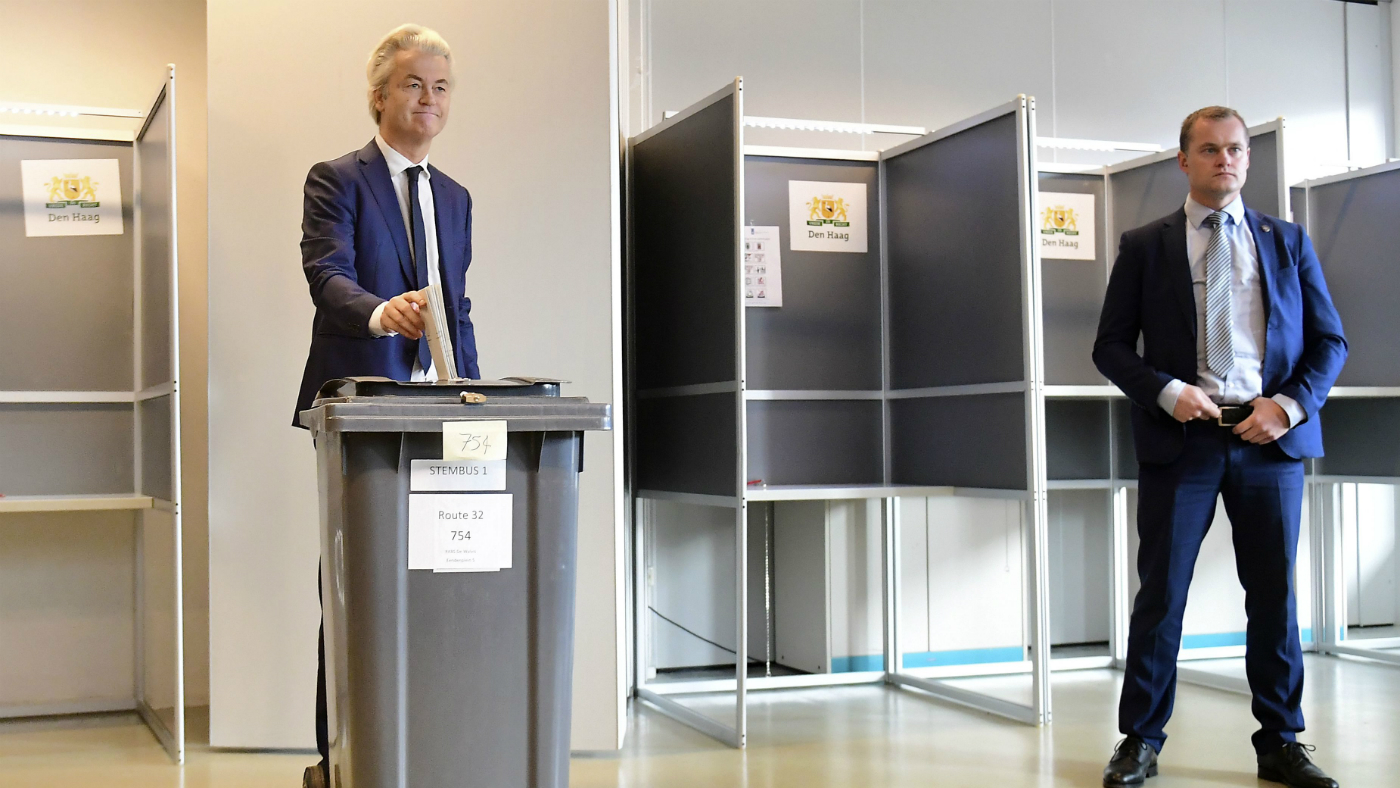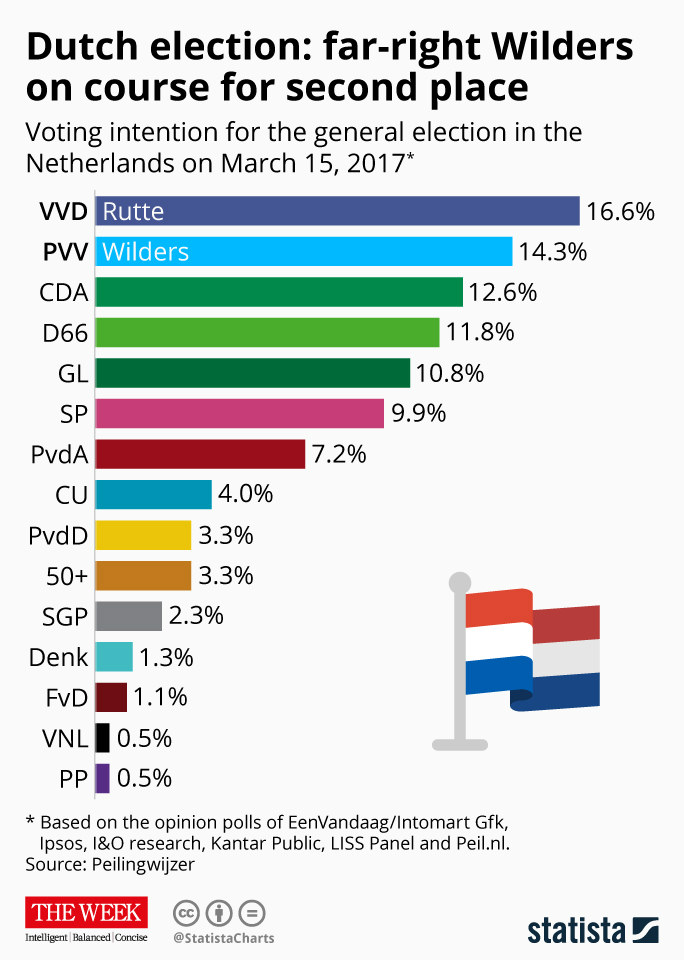Europe watches on as Dutch voters go to the polls
Mark Rutte expected to lead next coalition – but has far-right politician Geert Wilders really won the battle?

A free daily email with the biggest news stories of the day – and the best features from TheWeek.com
You are now subscribed
Your newsletter sign-up was successful
Voters in the Netherlands head to the polls today to vote in an election seen as a litmus test for the rise of far-right and populist parties in Europe.
Campaigning has highlighted the growth of populism, with anti-Islam far-right politician Geert Wilders and his PVV party dominating the agenda.
"The Dutch vote is the first of several critical European elections this year, to be followed by those in France, Germany and possibly Italy," says the New York Times.
The Week
Escape your echo chamber. Get the facts behind the news, plus analysis from multiple perspectives.

Sign up for The Week's Free Newsletters
From our morning news briefing to a weekly Good News Newsletter, get the best of The Week delivered directly to your inbox.
From our morning news briefing to a weekly Good News Newsletter, get the best of The Week delivered directly to your inbox.
Wilders has been neck-and-neck with incumbent Prime Minister Mark Rutte, although the latest polls suggest the VVD leader might edge ahead.

With as many as 28 parties fielding candidates, it is highly unlikely any party will reach the 76 seats needed for a majority, meaning four or five will need to come together to form a coalition.
However, even if Wilders's PVV gets a high percentage of votes, it is unlikely to make it into government as all the major parties have ruled out collaborating with him.
Nevertheless, his "high profile and often inflammatory presence had moved much of the political debate to the far right's turf. The battle in many ways is already won," says the New York Times.
A free daily email with the biggest news stories of the day – and the best features from TheWeek.com
Rutte has already been accused of pandering to right-wing voters after he published an open letter telling immigrants to leave if they did not respect Dutch values.
"The extreme likelihood is that Rutte… will remain as PM under a coalition of various parties," predicts Stephen Bush in the New Statesman.
Analysts believe the diplomatic spat between the Netherlands and Turkey has also given the PM a timely boost.
Andre Krouwel, a political scientist at Amsterdam's Free University, told The Guardian the row "allowed Rutte to show himself as a statesman – and to send a Turkish minister packing".
He added: "What better publicity could a politician want a few days before an election? Rutte was able to show he could actually expel Turks, and to tell Wilders, 'You're just sitting there, tweeting'… This has won Rutte the election."
Infographic by www.statista.com for TheWeek.co.uk.
-
 James Van Der Beek obituary: fresh-faced Dawson’s Creek star
James Van Der Beek obituary: fresh-faced Dawson’s Creek starIn The Spotlight Van Der Beek fronted one of the most successful teen dramas of the 90s – but his Dawson fame proved a double-edged sword
-
 Is Andrew’s arrest the end for the monarchy?
Is Andrew’s arrest the end for the monarchy?Today's Big Question The King has distanced the Royal Family from his disgraced brother but a ‘fit of revolutionary disgust’ could still wipe them out
-
 Quiz of The Week: 14 – 20 February
Quiz of The Week: 14 – 20 FebruaryQuiz Have you been paying attention to The Week’s news?
-
 Epstein files topple law CEO, roil UK government
Epstein files topple law CEO, roil UK governmentSpeed Read Peter Mandelson, Britain’s former ambassador to the US, is caught up in the scandal
-
 Iran and US prepare to meet after skirmishes
Iran and US prepare to meet after skirmishesSpeed Read The incident comes amid heightened tensions in the Middle East
-
 Grok in the crosshairs as EU launches deepfake porn probe
Grok in the crosshairs as EU launches deepfake porn probeIN THE SPOTLIGHT The European Union has officially begun investigating Elon Musk’s proprietary AI, as regulators zero in on Grok’s porn problem and its impact continent-wide
-
 Israel retrieves final hostage’s body from Gaza
Israel retrieves final hostage’s body from GazaSpeed Read The 24-year-old police officer was killed during the initial Hamas attack
-
 China’s Xi targets top general in growing purge
China’s Xi targets top general in growing purgeSpeed Read Zhang Youxia is being investigated over ‘grave violations’ of the law
-
 Panama and Canada are negotiating over a crucial copper mine
Panama and Canada are negotiating over a crucial copper mineIn the Spotlight Panama is set to make a final decision on the mine this summer
-
 Europe moves troops to Greenland as Trump fixates
Europe moves troops to Greenland as Trump fixatesSpeed Read Foreign ministers of Greenland and Denmark met at the White House yesterday
-
 Why Greenland’s natural resources are nearly impossible to mine
Why Greenland’s natural resources are nearly impossible to mineThe Explainer The country’s natural landscape makes the task extremely difficult